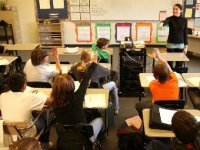Empowering Youth Voice Through SEL
In my work in New Jersey schools, I discovered many of the most empowered and vibrant schools had been touched by Patrick Fennell's work. So I thought an interview with him might allow me to learn about and more widely share his magic.
Edutopia: What do you mean by empowerment?
Patrick Fennell: My definition of empowerment is "to lead others to lead themselves." True empowerment is the belief that people, and more specifically our youth, have the ability to implement positive change in their own lives and the lives of others, and contribute to something larger than themselves.
Edutopia: How do we foster empowerment?
Fennell: By creating a safe and supportive environment that facilitates students' being aware of consequences to make responsible decisions, enhance their skills and abilities, and widen their interests in order for them to act on their own behalf.
Edutopia: Can you share a little bit of your compelling personal story and your approach to empowerment?
Fennell: I was a very shy child. In eighth grade, I was asked to mentor a third grade student at our school. The time that we spent working on projects may have assisted him, but it truly helped me to open up and recognize some of my own strengths.
I began working with a bank in my junior year of college. They recognized my ability to connect well with people and advanced me quickly through their management training program. Eventually, I was trained to facilitate workshops to develop the skills of teambuilding, communication, goal setting, and problem solving. I spent six years at the bank and seven years as a director of operations for an international fast food chain where I saw many people who were unsuccessfully trying to figure out who they were, what they wanted, and how to get there.
The money that I was making was great, but I realized that there was something more that I could be doing. So I left corporate America to assist young people with the same skills I facilitated for bank employees.
I founded Empowerment Solutions in 2004. Our motto is, "Live into, not up to." We focus on building positive culture and climate, and creating communities of learning. More and more people and schools are beginning to understand what SEL, character education, and SECD is and why it is important. We assist communities to discover how to implement it in a sustainable way.
Edutopia: What are some examples of programs that you have developed?
Fennell: I have had worked with children from preschool through high school through a variety of programs I have created and facilitated. These include: in-school leadership development, after-school character education and empowerment sessions, peer leadership training, advisor/advisee leadership training, peer mentoring, and intra-district mentoring (high school students mentoring middle school students or middle school students mentoring elementary students).
Another program is called I CAN -- an acronym for Intergenerational Community Advancement Network -- that connects middle school students with mentors from four different age groups (high school students, college students, career/professional adults, and retired or second-career individuals).
Edutopia: Can you recommend something that teachers can do in their classrooms today to begin empowering their students at the elementary, middle, and high school levels?
Fennell: The key to empowering students begins with the lens through which we view the students that we teach. If we see our students as unique, resourceful, intelligent, imaginative, and able, we become more willing to promote student-centered learning by providing opportunities to use their gifts, talents, and abilities, and develop their voices that will allow them to flourish today and in the future. Ultimately, it is through the development of mutually beneficial relationships with empowered peers and adults that positive contributions derive.
Edutopia: Implicit in your point is the need to rebalance the educational process.
Fennell: The most powerful student/teacher relationships are mutually beneficial -- a place where we listen to each other, learn from one another, and grow together.
Putting It to Practice
I then asked Patrick to give me his Top 10 Youth Empowerment Actions, and he explained that since David Letterman has retired, he felt better about doing this. So here they are:
1. Incorporate SEL into the curriculum in all subjects and levels of instruction.
2. It may seem too simple to be true, but ask them what they need! After the blank stares and the "I don't knows" subside, they begin to recognize that they do have a voice and that it is valued. It is also important to teach them how to appropriately express thoughts, opinions, and feelings in a manner that is respectful of themselves and others.
3. Focus on engaging and facilitating discussions and activities as opposed to directing and dictating them.
4. Provide opportunities to incorporate student choice into lessons, based on their interests, to promote discovery, critical thinking, and a true sense of being supported.
5. Give groups of three the responsibility and ownership of introducing new topics. Ask students to share what they know about a new topic before teaching it. Rotate the groups regularly.
6. Encourage and reward "being" in addition to "doing." Help youth focus on who they are on the inside.
7. Create projects that use varied gifts, talents, abilities, and perspectives to contribute to the whole.
8. Model an environment of respect (for others' thoughts, opinions, and values) and one that is fun and enthusiastic.
9. Get low. When a student is struggling with their work, physically position yourself at eye level as opposed to standing over them.
10. Don't be afraid to ask hard questions or admit that you don't know. Allow students' needs to outweigh our fears.
There are many valuable "do nows" and "do always" from Patrick's work that you can check out on the website for Empowerment Solutions. Please continue the conversation about youth empowerment and voice in the comments section below.
